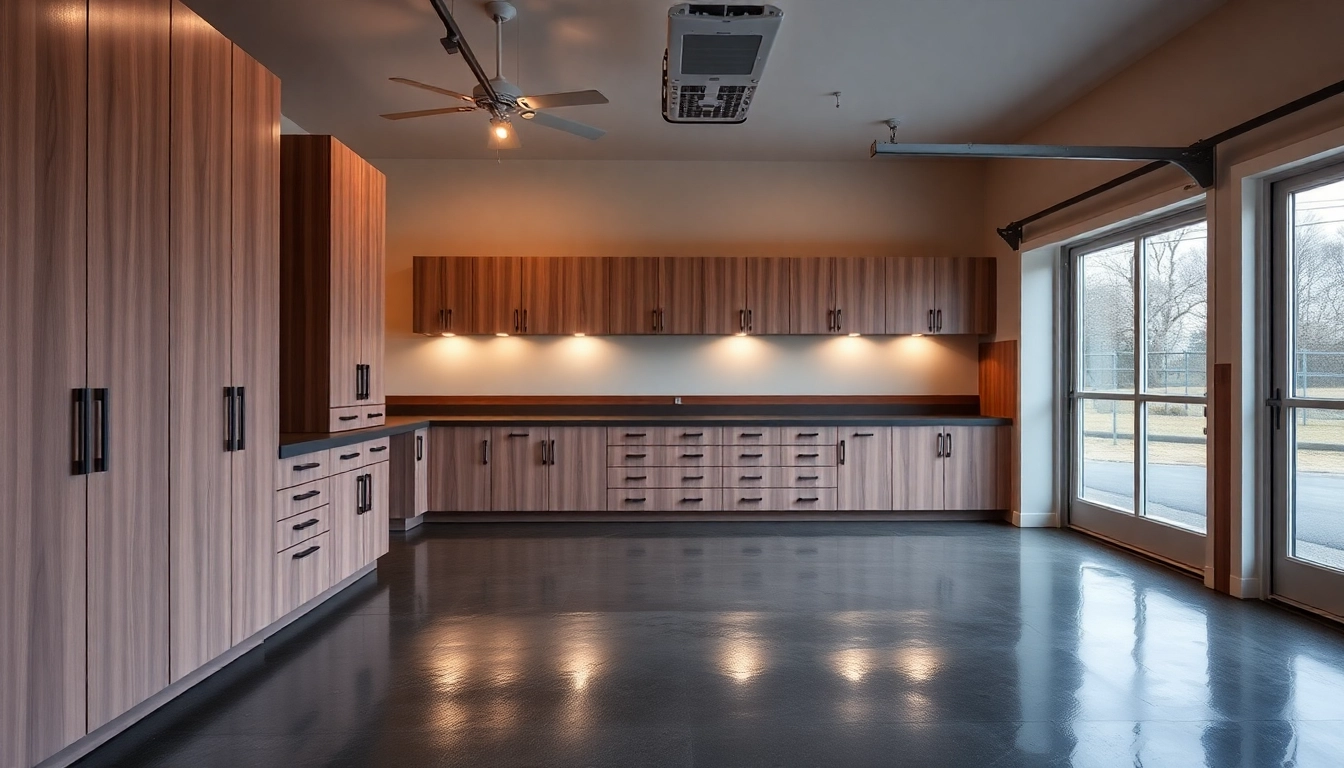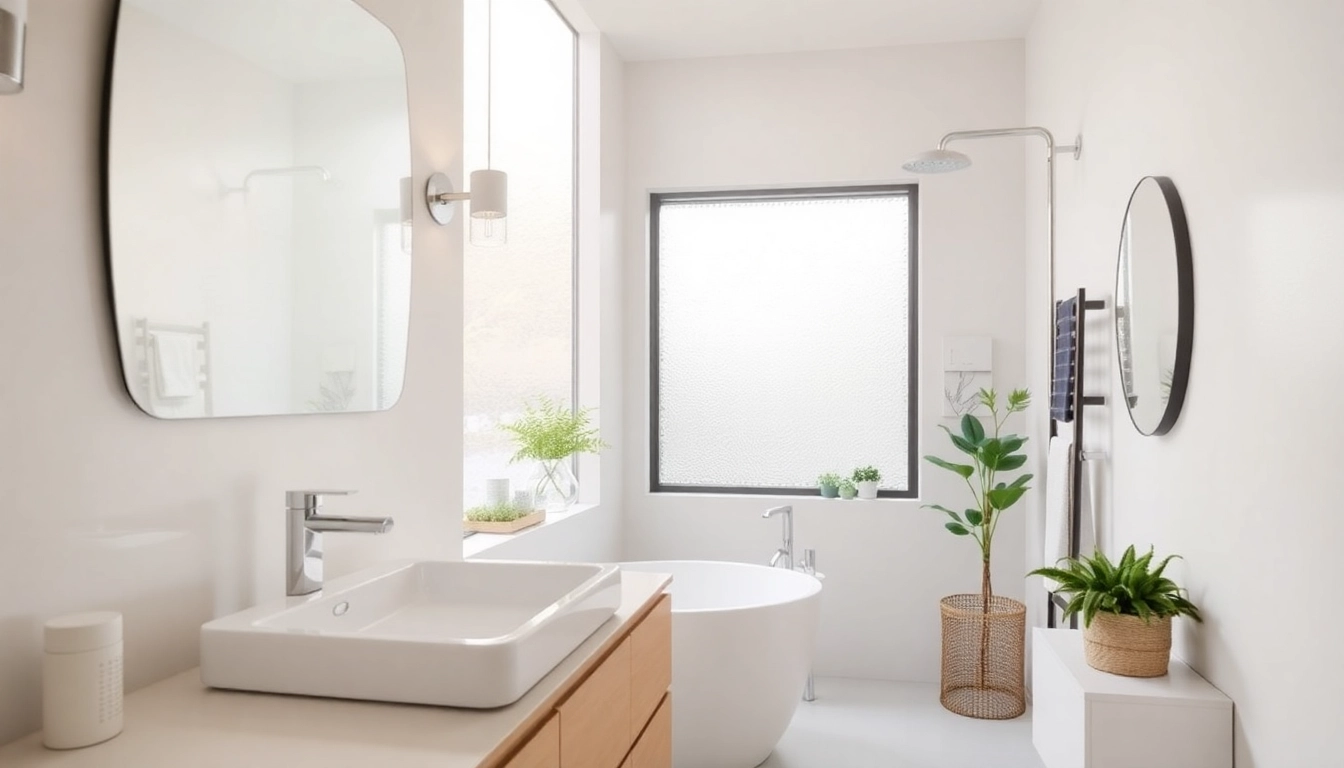Understanding Custom Garages
What Are Custom Garages?
Custom garages are specially designed structures that cater to the unique needs and preferences of homeowners. Unlike standard garages, custom garages allow for personalization in terms of size, style, and functionality. They can be built to accommodate various uses beyond just parking a vehicle, including serving as workshops, storage spaces, or even recreational areas. This versatility has made custom garages increasingly popular among homeowners looking to maximize their property’s utility and aesthetic appeal.
Essentially, custom garages blend functionality with bespoke design elements, ensuring that each garage aligns with the homeowner’s vision. Whether it’s a compact single-car setup or a expansive three-car garage, the possibilities are nearly limitless. With adept planning and skilled artisans, these garages can seamlessly integrate into the existing architecture of your home while providing ample space for vehicles, tools, and hobbies. Additionally, they can be equipped with modern amenities such as electric charging stations for electric vehicles, efficient lighting systems, and advanced insulation for temperature control.
Benefits of Custom Garages
The decision to invest in a custom garage can yield numerous benefits, often tailored to meet specific homeowner needs:
- Maximized Space: One of the primary advantages is optimizing available space. A custom garage can be designed to utilize every square foot efficiently, avoiding the wasted space often found in pre-manufactured options.
- Enhanced Aesthetics: With customizable finishes and styles, homeowners can match their garage design with their home’s architecture, promoting an overall cohesive look.
- Increased Property Value: A well-designed custom garage can enhance the resale value of a home, making it an attractive feature to potential buyers.
- Personalization: From the layout to the materials used, custom garages can reflect personal style and cater to specific needs, be it extra storage, workspace for hobbies, or vehicle protection.
- Improved Organization: Modern custom garages can incorporate built-in storage solutions and efficient layouts that promote organization, minimizing clutter.
- Versatile Uses: Beyond housing vehicles, these garages can serve as workshops, gyms, or recreational spaces, adding further value to the investment.
Different Types of Custom Garages
Custom garages come in various types, each tailored to different needs and preferences:
- Single-Car Garages: Ideal for homeowners with one vehicle, single-car garages can also include storage and workshop spaces without taking up excessive land.
- Two-Car Garages: Common among families, these garages often include additional features such as storage lofts or tool organizing solutions that maximize functionality.
- Three-Car Garages: Perfect for larger households or car enthusiasts, three-car garages offer ample space for multiple vehicles and can incorporate workspaces.
- Detached Garages: Detached options can add value to your property and offer a separate space away from the home for workshops or storage.
- Custom Barn-Style Garages: These provide a rustic aesthetic while maintaining the functionality of a traditional garage, often incorporating decorative elements.
- Modern Designs: Many homeowners opt for contemporary styles that feature clean lines, large windows, and innovative materials, giving the garage an attractive, non-traditional look.
Design Elements for Your Custom Garage
Choosing the Right Layout
The layout of a custom garage is critical to its functionality. Here are several key considerations:
- Access and Flow: Ensure that doors and pathways facilitate easy movement. A well-planned layout allows for hassle-free access to vehicles and tools.
- Storage Solutions: Including built-in shelving, cabinets, and workbenches in your layout can prevent clutter and ensure accessibility to tools and supplies.
- Future Possibilities: Consider the future usage of the garage. Are there plans to add more vehicles or implement new activities? Design the layout to accommodate these changes.
- Natural Light: Integrating windows or skylights can substantially improve the garage’s interior ambiance, making it more inviting and less confined.
Popular Materials and Finishes
The materials and finishes used in a custom garage can significantly impact its aesthetics, durability, and affordability:
- Wood: Offers a classic look, but requires regular maintenance. Wood can be treated, painted, or stained to enhance its appearance.
- Steel: Known for its durability and low maintenance, steel is often used for modern garage designs and can be treated to resist rust and corrosion.
- Vinyl: A low-maintenance option that’s available in a variety of styles and colors, vinyl can provide an attractive facade while keeping costs down.
- Concrete: Commonly used for flooring, concrete is both durable and affordable, and can be enhanced with finishes like epoxy for added aesthetics.
Incorporating Storage Solutions
Storage is one of the most crucial elements to consider when designing a custom garage. Here are ways to integrate effective storage systems:
- Overhead Storage: Utilizing ceiling space for storage racks or platforms can help keep floors clear.
- Wall Cabinets: These can be custom-installed to fit specific needs, ensuring that tools are within easy reach while still being organized.
- Combination Systems: Integrate shelving with hooks for tools and other items to maximize the use of every inch of space.
- Multi-Functional Furniture: Consider garage furniture that can serve multiple functions, such as a bench that can also be used as storage.
Cost Considerations for Custom Garages
Average Pricing Overview
The cost of custom garages varies significantly based on several factors, including size, materials, design complexity, and location. On average, homeowners can expect to pay:
- Small Single-Car Garages: Approximately $15,000 to $25,000
- Two-Car Garages: Typically range from $25,000 to $50,000
- Three-Car Garages: Costs can start around $50,000 and escalate to $100,000 or more depending on additional features and finishes.
It’s advisable to consult with multiple contractors to get a more accurate estimate based on your specific requirements and desired finishes.
Factors Affecting Garage Costs
Several key factors play a role in determining the final cost of a custom garage:
- Size and Dimensions: Larger garages naturally incur higher costs due to increased materials and labor.
- Location: The geographical area can influence labor and material costs. Urban locations may experience higher construction costs compared to rural areas.
- Design Complexity: More intricate designs or additions like high ceilings, workspaces, or advanced electrical systems will increase the cost.
- Quality of Materials: Premium materials will yield higher durability and aesthetics but come at a greater price.
- Local Codes and Permits: Adhering to local building codes and obtaining necessary permits can add costs as well.
Budgeting Tips for Your Custom Garage
Creating a budget for your custom garage is crucial to avoid unforeseen expenses:
- Get Multiple Quotes: Consulting various builders can help you find competitive pricing.
- Prioritize Features: Identify which aspects of your garage are non-negotiable and which can be adjusted to better fit your budget.
- Consider Phased Construction: If costs run high, consider building in phases and adding features over time.
- Include a Contingency Fund: Set aside extra funds for unexpected expenses during construction.
DIY vs. Professional Installation
When to Go DIY
DIY garage construction can be an appealing option for those with the necessary skills and tools. Here are scenarios where a DIY approach might work:
- Simple Designs: If your garage concept is straightforward without extensive plumbing, electrical, or structural changes, DIY might be feasible.
- Personal Experience: Those with experience in construction or carpentry may find the task manageable and fulfilling.
- Cost Savings: DIY can save substantial labor costs, although materials should still be purchased with care.
Finding Professional Help
Engaging professionals for your custom garage project ensures a high-quality finish and adherence to local codes:
- Research and Reviews: Look for reputable contractors with positive customer experiences. Websites like Yelp or Angie’s List can be instrumental in this process.
- Check Portfolios: Review past projects to gauge the quality of their work and creative abilities.
- Ask for References: Reaching out to previous clients can provide insights into contractor reliability and communication.
Understanding Project Timelines
Timelines are an essential aspect of any construction project. Here’s how you can manage expectations:
- Planning Phase: Allow several weeks for design and approval processes before breaking ground.
- Construction Phase: Depending on the complexity of the design, construction may take anywhere from a few days to several months.
- Weather Considerations: Weather can impact timelines significantly; builders should account for local climate conditions.
Maintenance Tips for Custom Garages
Keeping Your Garage Organized
Organization is key to maximizing the functionality of your custom garage. Here are some practical tips for keeping your space clutter-free:
- Regular Cleaning: Schedule regular clean-ups to prevent clutter from accumulating over time.
- Use Labels: Clearly label storage bins and shelving to quickly locate items.
- Implement a System: Divide items into categories and establish designated areas for similar items.
Long-term Care for Finishes and Materials
To preserve the appearance and functionality of your garage, long-term care is essential. Consider these tips:
- Routine Inspections: Regularly check for wear and tear on flooring, doors, and windows.
- Professional Cleaning: Depending on the materials used, hire professionals for periodic deep cleaning to maintain appearance and longevity.
- Protective Coatings: Applying protective coatings on surfaces can help resist damage from the elements.
Seasonal Maintenance Checklist
Seasons can bring unique challenges. Here’s a checklist to consider for maintaining your garage throughout the year:
- Spring: Conduct a thorough clean-up; check for pests or leaks; organize tools and equipment.
- Summer: Inspect insulation; ensure cooling systems are functional; maintain flooring surfaces.
- Fall: Prepare for winter by checking sealing and weatherproofing; clear leaves and debris from gutters.
- Winter: Monitor for ice or snow accumulation on garage roofs; check heating equipment; ensure vehicle maintenance.



